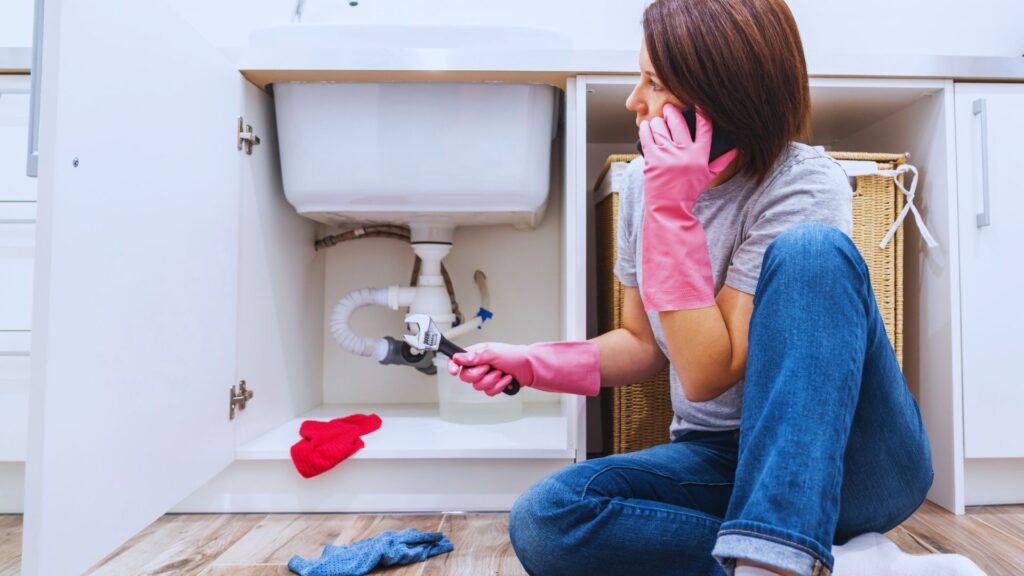If you’re lacking hot water, hearing strange noises from your heater, seeing water around the tank, or noticing rusty or murky water, it’s likely your heater’s failing. Factors including sediment buildup, corrosion, a faulty thermostat, and the age of the unit can cause these issues. Initially, verify safety by turning off the water and gas supply. Check your thermostat settings and look for sediment buildup. Consult with a professional for complex issues. Assess repair costs against buying a new unit; consider the heater’s age, the frequency of repairs, and future needs. Exploring further will equip you with more preventative insights.
Key Takeaways
- Monitor for lack of hot water, strange noises, water leaks, or rusty/murky water, which are signs of water heater failure.
- Common causes of failure include sediment buildup, corrosion, a faulty thermostat, or the unit’s age.
- For safety, immediately shut off the water and gas supply if leaks are detected and verify thermostat settings.
- Contact a licensed professional for complex issues or if you’re unsure about diagnosing the problem.
- Decide whether to repair or replace the unit based on its age, repair costs, frequency of repairs, energy efficiency, and future needs.
Understanding Water Heater Basics
While it may seem slightly technical, understanding the basics of how your water heater works can be immensely helpful in identifying potential issues before they escalate.
Your water heater, whether tank or tankless, operates on a simple principle. Cold water enters the tank and is heated by either a gas burner or electric heating elements.
A thermostat controls the temperature, ensuring water stays within a safe and comfortable range. The heated water rises to the top of the tank and is distributed to your home’s plumbing whenever you turn on a hot water tap.
Several factors can disrupt this process. Sediment build-up at the bottom of your tank can cause overheating and premature wear on the tank. Faulty heating elements or a malfunctioning thermostat can lead to inconsistent water temperatures.
Even the quality of your water supply can affect the longevity of your water heater, with hard water causing more wear and tear.
Knowing these basics allows you to diagnose issues with your water heater better and take necessary steps before a minor problem turns into a major failure, making timely water heater repair Lakewood CA, essential.
Signs of a Malfunctioning Water Heater
Now that you’re familiar with how your water heater operates, let’s identify the signs that it might not be functioning properly.
First, an obvious sign is a lack of hot water. If your showers are turning chilly, it’s a good indication that something’s wrong.
Next, listen for strange noises. Your water heater shouldn’t sound like a kettle boiling. Popping or rumbling noises can signify sediment buildup, which reduces efficiency and can cause damage.
Water around the tank’s base is another telltale sign. Leaks can occur due to a range of issues and can lead to significant water damage if not addressed quickly.
If your water is rusty or murky, it could mean that there’s corrosion inside the tank or that the anode rod intended to prevent such corrosion has failed.
Finally, if you’ve noticed a decrease in your hot water supply, it could mean your heater isn’t able to keep up with demand or that there’s a problem with the heating elements.
Common Causes of Water Heater Failure
Although your water heater may seem robust, it’s not invincible. Over time, various factors can lead to its failure. One of the main causes is sediment buildup, which can make your unit work harder than it should, leading to premature wear and tear. This usually results in strange noises or inconsistent water temperatures.
Another culprit is corrosion. As your tank ages, it’s susceptible to rust, which can lead to leaks and tainted hot water. If you notice rusty water or puddles around your heater, corrosion might be the problem.
A faulty thermostat can also cause issues like the absence of hot water or temperature fluctuations. Your unit’s thermostat may malfunction due to electrical problems or simply because it’s worn out.
Lastly, the age of your water heater plays a significant role. Most units have a life expectancy of about 10-15 years. If yours is older, it may be nearing the end of its useful life.
Understanding these common causes of water heater failure helps you to recognize potential issues early and take appropriate action.

Immediate Actions to Take
When you’ve identified signs of water heater failure, it’s vital to act swiftly to prevent further damage. First and foremost, guarantee your safety. If there’s a significant leak, turn off the water supply to the heater to prevent water damage If you suspect a gas leak, which a rotten egg smell could indicate, shut off the gas supply immediately.
Next, try to diagnose the problem. If there’s no hot water, check the thermostat setting—it should be between 120 and 140 degrees Fahrenheit. If the water is too hot or cold, the thermostat might be faulty. If you’re hearing strange noises, it might be due to sediment buildup inside the tank. Rusty or discolored water could indicate corrosion inside the tank.
After making these initial assessments, it’s time to call a professional. Don’t attempt to fix serious issues yourself—water heaters are complex devices, and improper handling can lead to accidents.
Schedule an appointment with a licensed plumber or technician for a thorough inspection. They can accurately diagnose the issue and suggest the best course of action for reliable Lakewood water heater repair.
Deciding Between Repair and Replacement
After your water heater has been professionally evaluated, you’ll need to decide whether to repair or replace it. This choice is significant, affecting both your immediate finances and long-term energy usage, making it crucial to choose the right water heater repair services Lakewood.
First, consider the age of your heater. If it’s nearing the end of its typical lifespan (around 10-15 years), replacement might be your best bet. Continual repairs on an old unit can cost more than a new, efficient model.
Next, look at the repair costs. If the quote is more than half the cost of a new unit, replacing it is usually more cost-effective. Similarly, if you’ve had to make frequent repairs lately, a new water heater might save you from ongoing expenses and headaches.
Energy efficiency should also be a deciding factor. Newer models are often more efficient, which can help lower your utility bills.
Finally, think about your future needs. If you plan to expand your family or add a large bathtub, you might need a larger water heater soon.
Balancing these factors can help you make an informed decision.
But remember, every situation is unique, so what works for others may not work for you.
Prevention Tips for Water Heater Longevity
Regular maintenance is essential to help your water heater last longer and run more efficiently.
It’s not a complicated process, but it does require a consistent commitment.
Firstly, an annual tank flush is performed to remove sediment buildup, which can hinder heating efficiency and shorten the unit’s lifespan.
All you’ll need is a garden hose and a suitable outdoor area to direct the sediment water.
Secondly, inspect the pressure relief valve.
This valve is a safety feature that prevents excessive pressure buildup.
To check, gently lift the valve; water should freely flow out, then cease when you let go.
Next, monitor the anode rod.
This rod attracts corrosive elements, sparing the tank.
If more than six inches of the core steel wire is visible, or if the rod is coated with calcium, replace it.
To maintain the heater’s thermostat, keep it set at a consistent temperature, typically between 120 and 140 degrees Fahrenheit.
Lastly, insulate your water heater, especially if it’s located in an unheated space.
This simple step can greatly reduce heat loss and save on energy costs.
In Summary
So, you’re now well-versed in spotting water heater issues and how to respond. Don’t ignore these signs; a failing water heater can disrupt your comfort and inflate your bills. Whether it’s repair or replacement, act swiftly. Remember, preventative maintenance can extend your heater’s lifespan and save you money. Keep your home cozy and your showers warm; don’t let a faulty water heater rain on your parade. For reliable service you can trust, contact Pipe It Up for expert water heater solutions.



